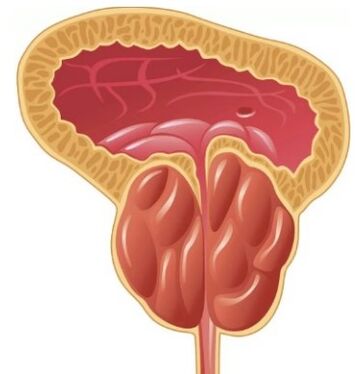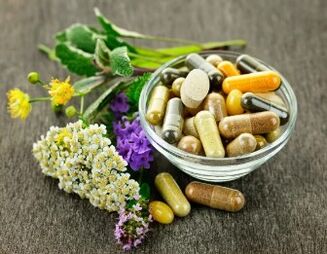Prostatitis is a disease that, according to statistics, every tenth man suffers.Pathology is diagnosed mainly from 30 to 50 years old. Many men are ashamed to talk about the symptoms of prostatitis to the doctor, which leads to the transition from the disease in a chronic form, complicates treatment and becomes problems with reproductive function.It is important to initiate therapy at the early stage of the pathological process.On which drugs for prostatitis in men are most often prescribed and considered the most effective.

What is prostatitis
Prostatitis is a disease characterized by an inflammatory process in the prostate gland (seed).Iron performs several of the most important functions, one of which is the production of a specific ejaculate secretion that provides sperm protection and nutrition.The composition of the liquid contains enzymes, proteins, fats, hormones, without which the reproductive system will not be able to perform its work normally.
Another more important function of the prostate is sperm tuning, because sperm become more mobile and, with a greater degree of probability, will achieve their goal.will be disturbed.At the same time, man feels characteristic symptoms.
The causes and signs of inflammation of the prostate
The main source of development of prostatitis is the penetration of infections and processes stagnant in seed gland tissues.Bacteria and microbes fall into the prostate of:
Genital organs;
Chronic outbreaks of blood flow infection (caries, sinusitis, sinusitis, flu, pneumonia, angina, furunculose);
- órgãos genitais;
- focos crônicos remotos de infecção por fluxo sanguíneo (cárie, sinusite, sinusite, gripe, pneumonia, angina, furunculose);
- Inflamed organs nearby (inflamed rectum), etc.
Factors that precede the development of the disease:
- Long abstinence of sexual intercourse; wearing very close clothes;
- Alcoholism, smoking, drug addiction;
- Frequent interruptions of sexual intercourse;
- Lower ejaculation;Malnutrition, lack of sleep);
- unique or constant hypothermia;
- The presence of chronic infections (bronchitis, amigdolitis, cholecystitis); strong sexual arousal, after which sex does not follow;
- Transferred urological diseases (cystitis, urethritis);
- Transfer of sexual infections (gonorrhea, trichomoniasis).Prostate adenoma, with a benign course, can also cause the development of the disease.In addition, the predisposing factor in the appearance of prostatitis is the perineum lesions.Often, they are observed in motorcyclists, drivers, cyclists, etc.
- It is worth noting that bacterial prostatitis is diagnosed 8 times smaller than non -infectious.The main reason for the last is iron stagnation.This leads to the difficulty of blood circulation in small vessels, the prostate tissue edema, increased the oxidation of lipid free radical.All these processes create conditions for inflammation and the occurrence of intense pain in the perineum and genitals.
- hipotermia única ou constante;
- a presença de infecções crônicas (bronquite, amigdalite, colecistite);
- Forte excitação sexual, após o que a relação sexual não se segue;
- Doenças urológicas transferidas (cistite, uretrite);
- Transferência de infecções sexuais (gonorréia, tricomoníase).
A hiperplasia, ou adenoma da próstata, com um curso benigno, também pode provocar o desenvolvimento da doença. Além disso, o fator predisponente no aparecimento da prostatite são as lesões do períneo. Muitas vezes, eles são observados em motociclistas, motoristas, ciclistas, etc.
Vale a pena notar que a prostatite bacteriana é diagnosticada 8 vezes menor que não infecciosa. A principal razão para o último é a estagnação em ferro. Isso leva à dificuldade da circulação sanguínea em pequenos vasos, o edema dos tecidos da próstata, aumentou a oxidação do radical livre dos lipídios. Todos esses processos criam condições para a inflamação e a ocorrência de dor intensa no períneo e genitais.
During the period of prostatitis exacerbation, men are observed:
- Rapid urination;
- urine can come out with blood impurities, pus; Mental disorders - irritability, lack of sleep, anxiety;
- violation of the urination process - can be difficult, painful;
- pain in the scrotum area, rectus and penis;
- violation of an erection.slightly.
- Pharmacological groups of prostatitis medicines
There are the following pharmacological groups of drugs for the treatment of prostatitis:
Antibacterial medications for prostatitis.They are prescribed to eliminate pathogenic microflora.With the help of active substances that make up medicines, pathogens that caused the infectious process are destroyed.Antibiotics are taken at the aggravated stage and during the period of disease remission.
Alpha-Drenoblockation.Doctors prescribe this group of drugs when it is necessary to improve urodynamics, relieve urine output to the patient and reduce the likelihood of the consequences of hyperplasia.
- Antispasmodic.Such drugs for the treatment of prostatitis are prescribed for pain to relax smooth prostate muscles, improve blood circulation.
- Non -steroid anti -inflammatory drugs with analgesic effect.Such drugs for the treatment of prostatitis are prescribed for pain, an increased tone of the perineum muscles, problems during urination and the inflammatory process.
- Analgesics.Stop the pain.They are prescribed in the form of tablets, rectal candles, injections.
- Medicamentos anti -inflamatórios não esteróides com efeito analgésico. Tais medicamentos para o tratamento da prostatite são prescritos para a dor, um tom aumentado dos músculos do períneo, problemas durante a micção e o processo inflamatório.
- Analgésicos. Pare a dor. Eles são prescritos na forma de comprimidos, velas retais, injeções.
- PHYTOPREPARATIONS.The composition of the medicines includes only natural components of the plant.They are prescribed in combination with medical medicines.Designed to eliminate pain, inflammation, relieve mental stress.They are prescribed in both chronic form and in exacerbation (in combination with other medications).
- Hormonal drugs for prostatitis.Eliminate the inflammatory process, reduce the swelling of the gland, normalize the urination process.

How to choose the medicine
Choose drugs for prostatitis should be necessary depending on the form of the disease.With exacerbation, antibiotics are mainly prescribed.The sooner you start taking antibacterial agents, the faster the symptoms will disappear and the lower the likelihood of complications and disease transition to the chronic stage.
If the disease is accompanied by pulling pain in the organic system organs, mental disorders in the form of irritability, anxiety, insomnia, sexual disorders.In this case, medicines that improve blood circulation that eliminate pain, inflammatory process and psyche problems should be taken.For these purposes, they are named:
- Analgesics;
- antispasmodic;
- NSAIDS;
- Antibacterial medications (with frequent exacerbations);
- Immunomodulators;Independent treatment can lead to serious consequences, one of which is infertility.
- Sedativos baseados em plantas.
De qualquer forma, apenas um médico pode prescrever medicamentos para prostatite após o exame. O tratamento independente pode levar a consequências graves, uma das quais é infertilidade.

























